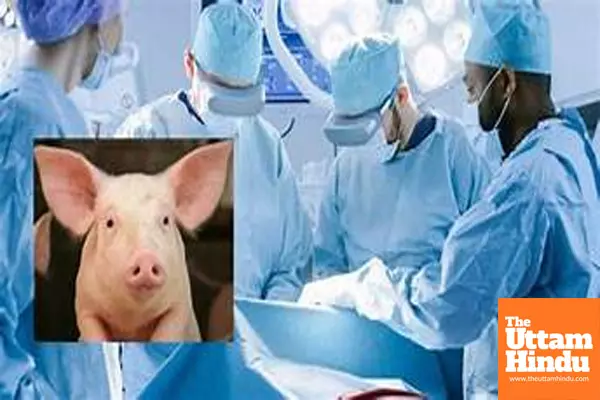
A New Era in Organ Transplantation: Chinese Doctors Perform First Pig Liver Transplant into Human

China (The Uttam Hindu) : In a groundbreaking medical achievement, Chinese doctors have successfully transplanted a pig liver into a human patient for the first time ever. This revolutionary procedure, which has been hailed as a potential miracle in the field of medicine, took place in a hospital in Beijing, where the transplant was carried out on a brain-dead patient.
The Historic Surgery
The transplant was part of a series of pioneering experiments aimed at overcoming the global shortage of human organs available for transplant. Doctors at the hospital used a genetically modified pig liver, which was designed to reduce the likelihood of rejection in humans. This is the first time that a non-human organ has been successfully transplanted into a human body in such a procedure. According to the medical team, the recipient of the transplant was a brain-dead individual whose organs were no longer viable for use. The doctors decided to proceed with the pig liver transplant as part of a medical trial to test the viability of animal organs for human transplantation.
A Revolutionary Step in Xenotransplantation
The transplant marks a significant step in the field of xenotransplantation, the practice of transplanting organs or tissues between different species. While xenotransplantation has been attempted in the past, particularly with organs from primates, this is the first time a pig organ has been successfully implanted into a human body. Scientists have been exploring xenotransplantation for many years as a potential solution to the shortage of human organs for transplant. Pigs have been considered the most suitable candidates due to the similarities in size and structure of their organs to those of humans. Additionally, pigs are relatively easy to breed and maintain, making them an attractive source for organ donations.
The Role of Genetic Modification
To minimize the risk of organ rejection, the pig liver used in this transplant was genetically modified. This process involved altering the pig’s genes to make the liver more compatible with the human immune system. By editing the pig’s DNA, scientists were able to reduce the chances of the human body rejecting the pig organ, a common challenge faced in previous attempts at xenotransplantation. The doctors involved in the procedure have stressed the importance of these genetic modifications in making the transplant successful. They believe that this approach could pave the way for further research into the use of animal organs for humans, especially as the global demand for organ transplants continues to rise.
Implications for the Future of Organ Transplants
The success of this pig liver transplant could have far-reaching implications for the future of organ donation and transplantation. With the growing shortage of human organs, especially for liver, kidney, and heart transplants, xenotransplantation could become a vital alternative. In countries around the world, thousands of people die each year waiting for an organ transplant, and this breakthrough could offer new hope to those in need. However, despite the success of this surgery, experts caution that there are still many hurdles to overcome before xenotransplantation becomes a mainstream practice. The long-term effects of animal organ transplants in humans remain unknown, and further research is needed to understand the risks of disease transmission and immune system rejection.
Challenges and Ethical Considerations
While the potential benefits of xenotransplantation are enormous, there are several ethical and safety concerns that need to be addressed. Many worry about the possibility of zoonotic diseases (diseases that can be transmitted from animals to humans) being transferred through animal organ transplants. Additionally, there are concerns about the welfare of the animals involved in such procedures and the moral implications of using animals for organ donations. As such, researchers are continuing to study the risks and benefits of xenotransplantation and how to mitigate potential harm. Regulatory bodies will likely take a cautious approach to these developments, ensuring that the procedure is safe and ethically sound before it can be widely adopted.
A Step Toward Solving the Organ Shortage Crisis
Despite the challenges, the successful pig liver transplant represents a significant leap forward in the quest to address the global organ shortage crisis. If further research proves that animal organs can be safely and effectively used in humans, it could change the way organ transplants are performed worldwide. This could provide a much-needed solution for the thousands of patients waiting for life-saving transplants.
Chinese doctors have made history with the successful transplant of a pig liver into a human patient. While there are still many hurdles to overcome, this achievement brings hope for the future of organ transplantation. It also opens the door to the possibility of using animal organs in human surgeries, offering a potential solution to the global organ shortage and saving countless lives in the process. As research continues, the medical community remains cautiously optimistic about the role xenotransplantation could play in the future of medicine.

